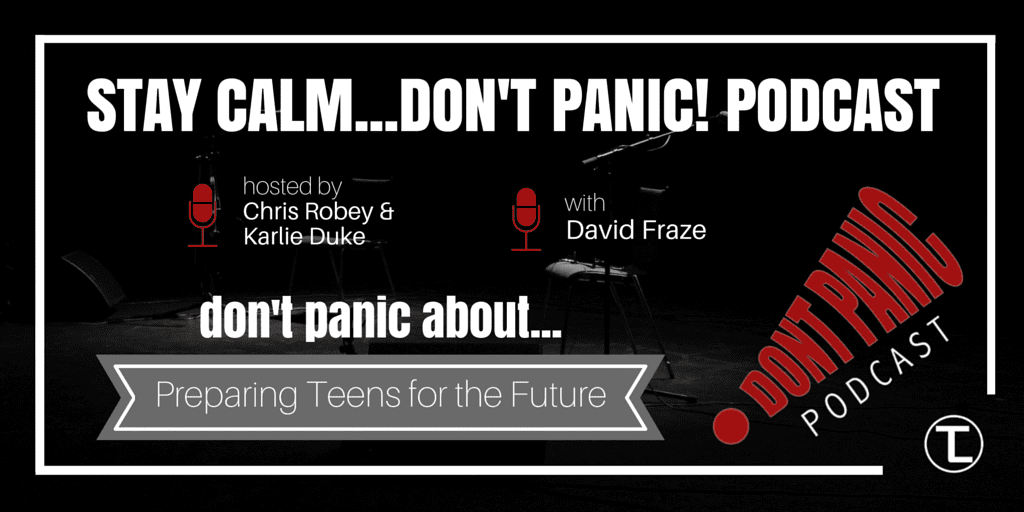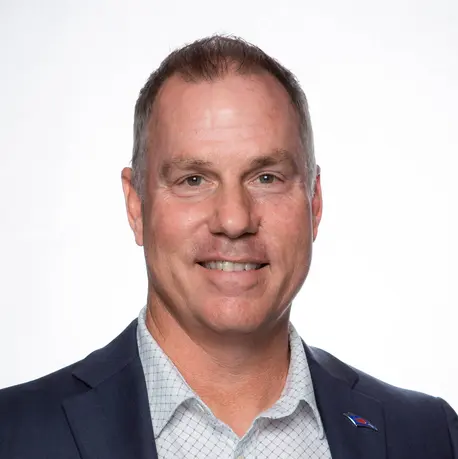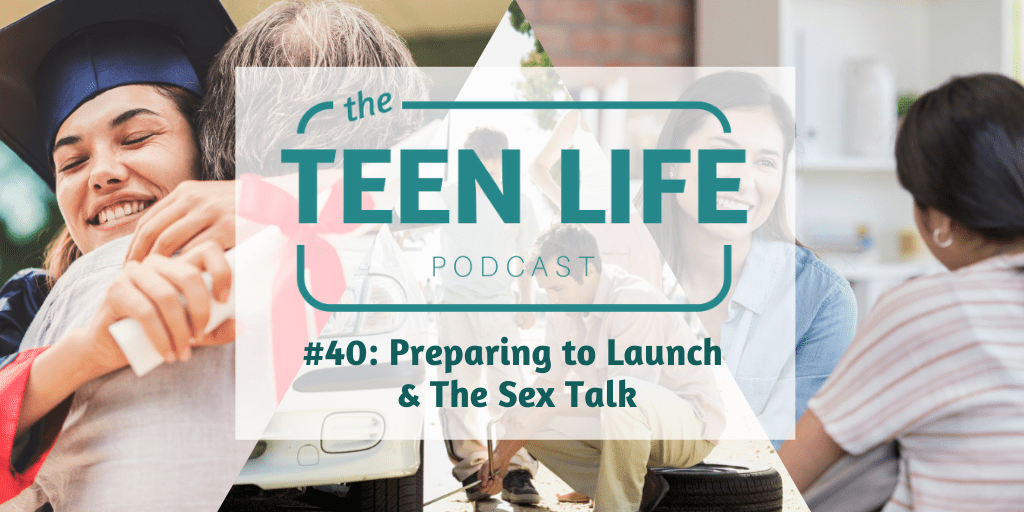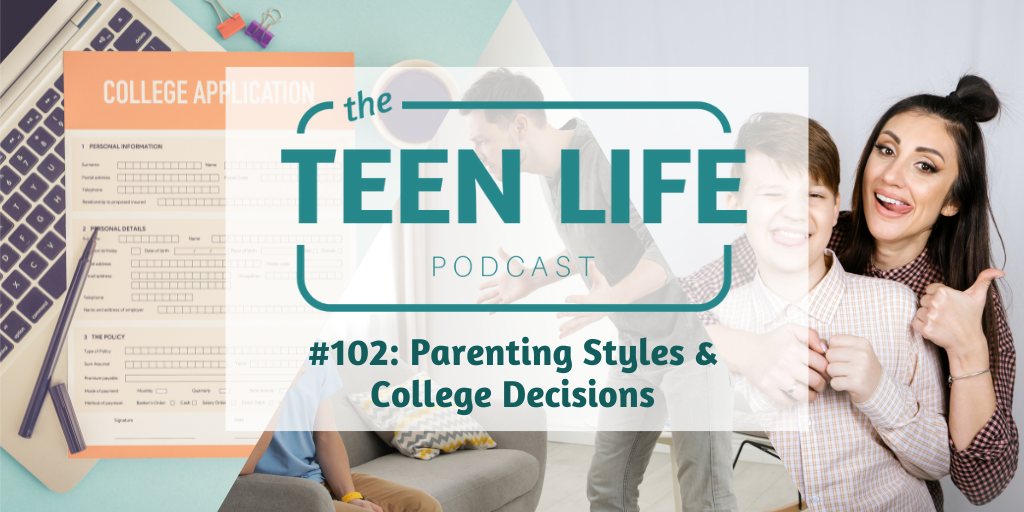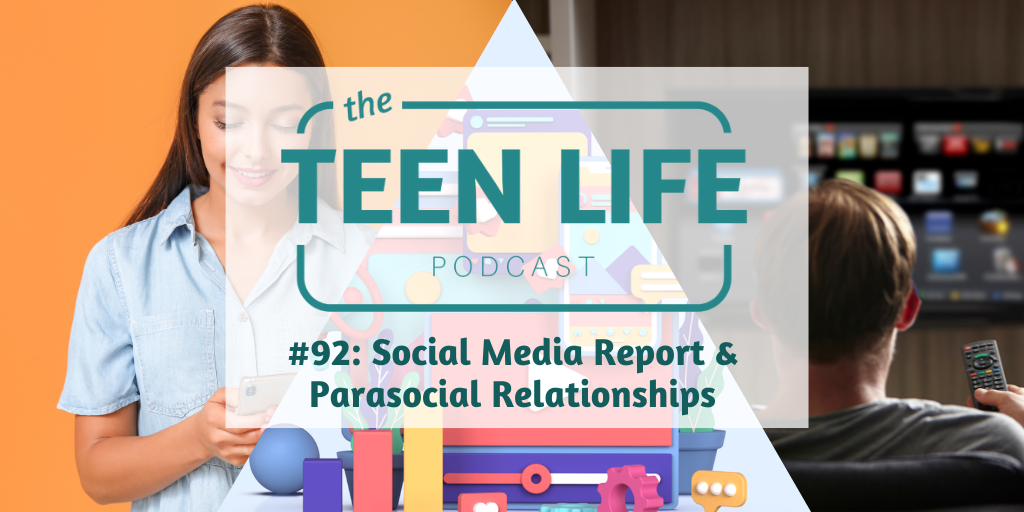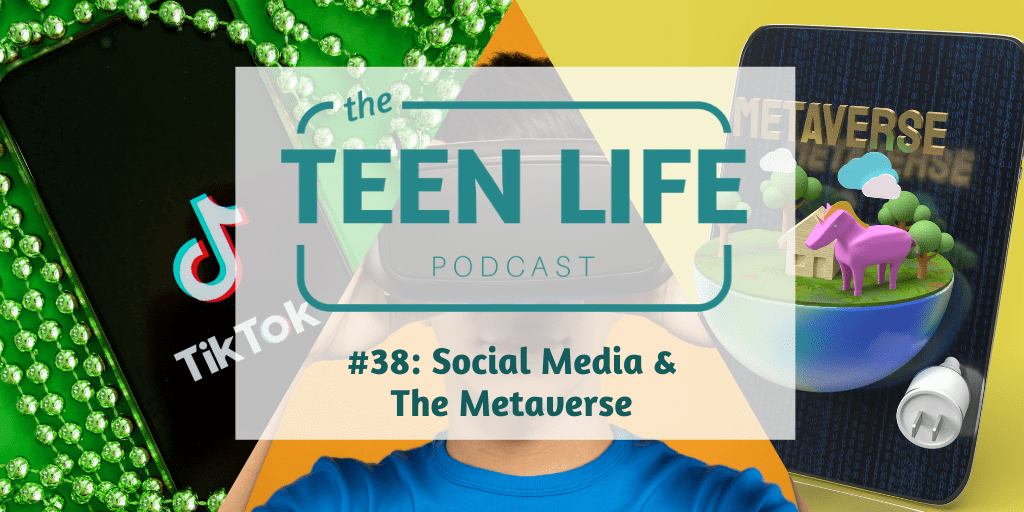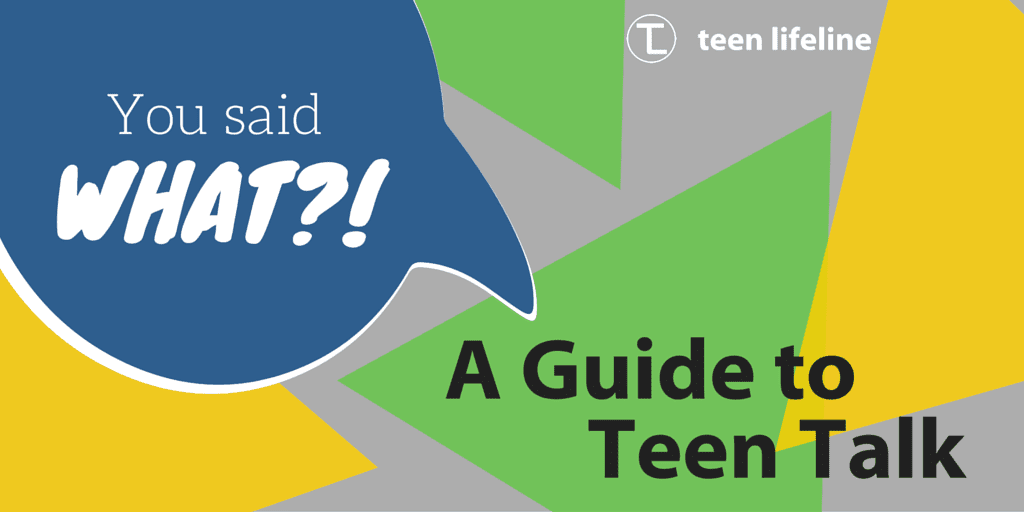
by Karlie Duke | May 5, 2016 | Parenting, Resources
When you hang out with teenagers every week who tend to push the boundaries and find themselves in trouble at school, you have learn some new vocabulary pretty quickly! This is the position I find myself in…often.
I cannot tell you how many times I have sat in a group, dumbfounded and confused, while the entire room laughs at a word or phrase I don’t know. Teenagers can sometimes have a different language. They talk in lots of letters and seemingly innocent phrases can mean something else entirely!
So what can we do? How do we keep up? What do these words even mean?!
If you spend any time with teenagers, you should find these principles helpful (and stick around for our teen term guide at the bottom):
Pay attention
This one seems self-explanatory, I know! But if you aren’t paying attention to what your teen is saying, the words they are speaking to their friends or the phrases they use in text messages and on social media, you won’t know where to start. Pay attention to what they, and their close friends, are saying – especially if you hear something that doesn’t make sense (i.e. a bunch of letters like wtf or bae).
Take note of what you don’t understand and follow-up on it! They often think that they are getting away with something by using code, so turn the tables on them and start listening and asking questions!
Ask them for clarification
After you have paid attention and hear a word that you don’t know, ask them about it. It could be possible that they don’t even really understand what it means and just hear it at school, or they might start acting funny and you’ll know you’re on to something!
If you hear something you are concerned about, don’t be afraid to confront that teenager and let them know that you are listening to what they are saying and care enough to start a conversation about it. But keep in mind, this should be a conversation – ask for clarification and then sit back and let them respond.
Google it
This tends to be my go-to, especially when I don’t want them to know that I have no idea what they’re talking about…
(Don’t tell my secret), but in times like these, I pretend like I know what these words and phrases mean. It’s not hard to figure out that they aren’t talking about monkey bars when they say they were doing “bars” and the rest of the group either laughs or looks quickly at me to check my reaction. At the time, I had no idea what bars were, but I pretended I did, shut down the conversation and went home to safely Google-it myself.
At Teen Lifeline, we firmly believe in being present and active in teenagers’ lives. This may mean asking awkward questions or having uncomfortable conversations when you figure out what they are actually talking about. But it is worth it! Show that you have some street-cred and keep up to date with the newest phrases and coolest terms.
Here’s a good starting point if you have no idea what to listen for:
(*Disclaimer: This blog post is not meant to make you paranoid or cause you to grill your teenager as soon as they get home. Not every teenager even knows what these words mean – please don’t assume the worst! Instead of panicking, pay attention and keep the door open for positive conversations!)
Teen Lifeline Dictionary
| Term | Meaning | Example(s) |
| Netflix & Chill | This is not just hanging out and watching movies - this means "hooking up" or having sex. | Wanna go Netflix and chill? |
| Bae | Before anyone else; baby; sweetie | Ryan Gosling is bae.
I love you so much bae!
|
| Hooking up | Could mean literally anything - kissing, making out, sex - ask what their definition is! | Did you hear that they have been hooking up? |
| GOAT | Greatest Of All Time. | Tony Romo is the G.O.A.T!
Those shoes are G.O.A.T. |
| Lit | Incredibly awesome; or extremely intoxicated. | This song is lit!
Last night, I got lit. |
| DM | Direct Message - private messaging on Twitter or Instagram | Can't talk now, DM me.
He slid in my DM. |
| Molly | Drug called MDMA or ecstasy | She took a Molly last night. |
| WTF | Pronounced "W-T-F," meaning "What the f***?!" | WTF is wrong with you?! |
| Goals | When something is attractive or it's something you aspire to. | Ben & Lauren are relationship goals.
Your hair is goals! |
| AF | Pronounced "af," meaning "As f***" | I'm hungry af.
That class was boring af.
She is annoying af. |
| PAW or PIR | Parents Are Watching or Parents In Room - if you see an acronym starting with 'P' ask questions! | Let's talk later PAW/PIR
|
| V | Short for "very." | I'm v tired.
Dinner was v good! |
Are there any other words or phrases you’re curious about? Do you have any suggestions for how to start this conversation? Share with us!
Karlie Duke was in one of Teen Lifeline’s original support groups and now is our Communications Director. She is passionate about encouraging students to live better stories.

by Karlie Duke | Apr 14, 2016 | Parenting, Support Groups
The more I work with teenagers, the more evident is that they are their own worst enemy and biggest critic.
Check out this story from one of our facilitators, Josh Hardcastle, about a conversation that happened in his support group with teenage guys:
A couple of weeks ago, we were talking about the negative influences and negative voices in our lives. Some of the guys in the group spoke up and were talking about how when other people put them down, they believe it. They believe that they…
Are Lazy.
Are Stupid.
Won’t Succeed.
Are Slow.
Are Punks.
Can’t get anything right.
So then I threw out the question, “What if you didn’t believe them?”
I had remembered a line from a book I read that said something like, “The names that we embrace are the names that we become.” I shared with them some of the struggles with the names that I had been called in High School by a coach. After hearing it so many times, I began to believe that I was that name.
There was something about this whole conversation and group time that really clicked with them. I could actually see hope and strength starting to resonate with a few of them. They were sitting up straight and absolutely silent. Not because they didn’t know what to say, but because it looked like they were thinking about not believing they were these names that they had been called for so long.
Towards the end of the group time, one of the guys asked, “So does this work with me too? Because I put myself down more than anybody else.”
Man that broke my heart! But we were able to have a conversation as a group about what that looked like and how we can avoid embracing the negative names and voices we call ourselves. I closed out the group by asking, “What do you guys notice about everyone’s pages and what they heard from the important voices in their lives?” A few of them gave me the answers that most everybody had written down their family or best friends, but one of my quiet kids raised his hand and said, “Everyone has more than two important, positive voices who speak into their lives.”
I took it one step further and asked, “So what does that mean?” Another guy jumped in and said, “That we should be listening and focusing on the positive voices and ignoring the negative ones.”
Boom. Nailed it.
Teenagers are surrounded by all kinds of negative and critical voices, but these voices do not just come from outsiders. Sometimes, the worst thoughts are coming from inside their own heads.
So what can we do? How can we help encourage teenagers to think positively and be a better judge of their self-worth? I have a few suggestions for what we can do as parents, teachers, mentors and friends:
1. Ask questions that will allow them to brag.
Instead of bringing up that “B” on a test, or the fact that they were late getting home (…again), ask one of these questions: “What is one thing that you did really well today?” or “How did you help someone today?”
By asking these question, you are prompting their own brain to focus on the positive aspects of the day. You are telling them that they are capable of great things and you want to hear about the things that they are going well.
Let’s help train teens to engage in beneficial bragging! Bragging that fosters a good sense of self-worth and positive self-esteem.
2. Point out the little things.
Did your teen wash the dishes without being asked? Say, “THANK YOU!”
Resist the urge to say something like, “What’s wrong with you?! You never do the dishes without asking!” or “Finally! Now you’re doing the dishes every night for the rest of your life!”
I know this might be a silly example, but by encouraging the little things they do without adding a backhanded dig or sarcastic comment, they will also pay attention to the important role they can play!
Tell them when you are proud. Hang up that last report card on the fridge. Brag about the way they love on their siblings. Teenagers are necessary, helpful, hardworking and FUN – don’t forget that!
3. Encourage realistic goal-setting.
When I am hard on myself or engage in negative self-talk, it tends to be when I am disappointed in myself or feel like I haven’t reached the goal I set for myself. After a busy week, I am upset that the house is a little messy and that I didn’t cook every meal at home. I beat myself up when I miss one tiny detail on a big project, or find a typo in a blog post.
Goals are a great thing to have, but we should be realistic and not sweat over the little things! Encourage teenagers to set small goals. When they reach that goal, help them celebrate and especially if they don’t matter – forget about the tiny things that might not be perfect.
Perfection isn’t a realistic goal. But here are a few realistic goal examples for teenagers:
- Be on time to school in the morning – who cares if you forgot to brush your hair or ate a pop tart instead of a well-rounded, healthy breakfast?!
- Help with one thing around the house – start small by making the bed, or doing the dishes after dinner!
- Improve on the next test – don’t get upset if the next grade isn’t a perfect 100, but strive to do better than that last test!
Once you help them come up with, write down and spend time on their goals, don’t forget to celebrate when a goal is reached!
What do you think of these ideas? How else can we encourage teenagers to engage in positive self-talk?
Karlie Duke was in one of Teen Lifeline’s original support groups and now is our Communications Director. She is passionate about encouraging students to live better stories.

by Karlie Duke | Mar 10, 2016 | Dating, Entertainment, Parenting, Pornography
How do we combat the false image of romance portrayed in the media we consume?
Before you freak out about the title of this blog, give me a chance to explain.
I am a hopeless romantic. My favorite movie is still Disney’s Beauty and the Beast. I love the stories where the princess falls in love and lives happily ever after. When it comes to books, I read anything and everything with a love story – Nicholas Sparks, The Twilight Saga, The Selection Series, anything by Karen Kingsbury. I have iron-clad opinions on whether Katniss should end up with Gale or Peeta. I cried my way through The Notebook and even read the less-popular sequel.
I admit that I am a faithful watcher of The Bachelor and The Bachelorette. I can tell you the names of the couples that are still together, watched all their TV weddings and even follow a few of my favorites on social media. I love the romantic dates, seeing who will get a rose each week, and watching the guys pick out the perfect engagement ring. I live for that final episode when the man gets down on one knee, and you see their love story come together for the perfect finale. Have I mentioned that I love all things romance?
But “porn,” really?? “Porn” can be a taboo word for our culture. Yes, we know it is out there, but we are not always willing to talk about it. Why would we want to bring up such an awkward topic with our teenagers? They don’t struggle with pornography addiction…and especially not my daughter!
Think again. According to research done by Covenant Eyes, 90% of boys and 60% of girls are exposed to pornography before the age of 18. That is your teenager. They are growing up in a culture where they can access pornography 24/7 on their television, laptop, or on the tiny phone that is attached to their hand. Pornography is a problem for adolescents and an issue that we do not ignore, but this blog is not about that type of pornography – naked pictures, sexting, magazines and x-rated movies (we will save that for another day).
For today, I want to speak mainly to the girls out there. Whether or not you connect with my story (or know someone else that does), I believe that our culture encourages girls and women to fall in love with these fictional men and their perfect relationships where arguments and morning breath do not exist.
In their book, Dateable: Are You? Are They?, Justin Lookadoo and Hayley DiMarco write:
“This is the #1 thing that distorts a girl’s view of reality, men and relationships. Maybe you haven’t heard it called female porn. Maybe you know it by the softer, more acceptable terms of “chick flicks” and romance novels…Your porn isn’t sexual, it’s romantic. But it gives you a warped view of men…if you have a man in your life, you begin to look at him in light of Mr. Perfect, and he can’t compare. He’ll never be as beautiful or romantic as the movie star with all the makeup and good lighting…It creates men who rescue you from out-of control buses and shower you with rooms full of roses. They fly you off to Paris for the weekend and save you from the evil villain bent on destroying the world. These men don’t exist…you are imposing an impossible set of demands on your guy.”
I am not saying that we need to ban romance movies or books – what would I do in my free time?
But I do have a few suggestions for how we can combat this culture where girls are looking for a Prince Charming who will never come, and where guys feel like they can never live up to the romantic standard set by Hollywood.
1. Discuss realistic expectations.
When you talk to teenagers about the latest romantic comedy, make sure that they know that those are unrealistic expectations. While it is not unrealistic to expect a man to open your car door, hold your hand or treat you like you deserve to be treated, men (just like women) are imperfect. They aren’t going to bring home flowers every day. Their lines aren’t written by a producer who makes a living by making you cry. They probably aren’t going to stand outside of your window with a boombox to win your affection. They sometimes smell, they don’t always enjoy everything you do and they probably don’t have the bank account to support your love of diamonds or to fly you across the world for an exotic date.
It is okay to give a reality check. Encourage them to write down what they are actually looking for in their “perfect mate.” Focus on qualities and characteristics, not necessarily on their physical appearance or ability to give great gifts.
2. Set Realistic Boundaries
You know your teenager best. If you see them falling into this romantic porn trap, set a few boundaries. Maybe they need to take a break from Nicholas Sparks. Perhaps you set a boundary where they have to sit down and have a discussion with you after they watch or read anything in that romance genre. Encourage them to find new, age-appropriate TV shows, books, or movies to invest their time in – try watching The Voice or Fixer Upper. Protect their hearts by limiting their exposure to romantically-saturated forms of entertainment. Maybe it is time to start a new hobby, like knitting!
3. Model Realistic Relationships
Real relationships exist, so don’t hide the realities of marriage from your teenager. You are doing a disservice to your children if you pretend that your marriage is as perfect as the ones we see on-screen. It’s okay for them to see you argue every now and then. Start bragging about the little things that your spouse does. Show that romance can come in the form of a well-timed kiss on the cheek, coming home to clean dishes, or a text asking how your day was. Surround your teenagers with healthy relationships, in and out of the home, where they can see how marriages work on a day-to-day basis.
What do you think of this idea of female, or romantic, porn? Do you have any other ideas for how we can protect and encourage teenagers?


